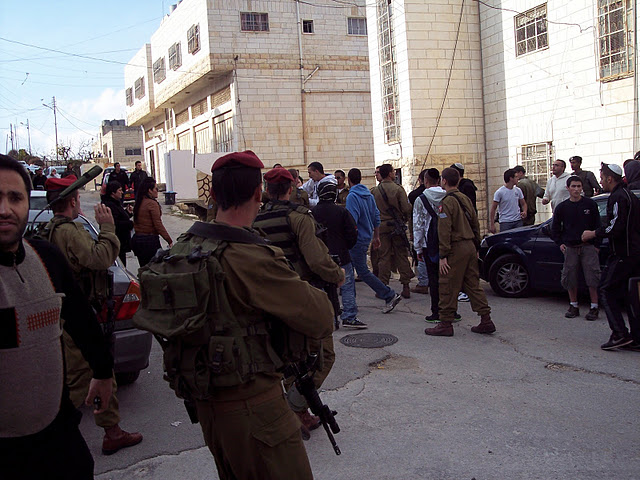-
21 arrested in Nabi Saleh demonstration commemorating the death of Mustafa Tamimi
16 December 2011 | Popular Struggle Coordination Committee Soldiers attacked the peaceful demonstration, shooting tear-gas projectiles directly at protesters. 21 were arrested in an attempt to block the entrance to Halamish settlement and to reach the village’s confiscated spring Hundreds joined the weekly demonstration in Nabi Saleh today, marking the killing of Mustafa Tamimi (28), who […]
-
In Photos: The construction of segregation
by Jenna Bereld and Samar 16 December 2011 | International Solidarity Movement, West Bank Today, Israeli soldiers once again denied the Palestinians’ right to assemble and protest against the construction of the illegal separation wall. About fifty villagers of Qalandia gathered after the Friday prayer and went to the construction site in a peaceful demonstration. […]
-
Settlers and military jump pedestrians in Tel Rumeida
by Fida Far 16 December 2011 | International Solidarity Movement, West Bank When my friend and I decided to walk downtown, we didn’t expect that this walk could be dangerous. There was a funeral going on for a settler woman who had been killed by her ex-husband, who in turn committed suicide. First we passed […]
Action Alert An Nabi Saleh Apartheid Wall Arrests BDS Bethlehem Bil'in Cast Lead Demonstration Denial of Entry Ethnic Cleansing Farmers Gaza Global Actions Hebron House Demolition International law Israeli Army Jerusalem Live Ammunition Nablus Ni'lin Prisoner Ramallah Rubber-coated steel bullets Settlement Settlers Settler violence Tear-Gas Canister Video


